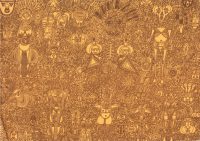
Theresa-India Young, undated. Courtesy of the Theresa-India Young Estate.
University Archives and Special Collections in the Joseph P. Healey Library at UMass Boston was awarded a Research Inventory Grant from Mass Humanities in June 2017. This allowed us the opportunity to devote a significant amount of time and resources to acquire, arrange, and describe the papers of noted Boston fiber artist, educator, and artist activist, Theresa-India Young. The collection was donated by Jacqueline McRath, executrix of Young’s estate in 2016. An exhibit showcasing materials from the collection is planned for June 2018 at the Grossmann Gallery in the Joseph P. Healey Library.
The Theresa-India Young papers, spanning 41.75 linear feet, document her work as a fiber artist, interdisciplinary arts teacher, and education consultant working in the Boston area from 1975 to 2008. Young taught studio art and museum education at Massachusetts College of Art and Design, where a scholarship is endowed in her name. She also taught at the Museum of Fine Arts, Roxbury Community College, Boston Public Schools, Elma Lewis School of Fine Arts, Harvard University Museum, Cambridge Friends School, Lesley University, and Wheelock College.
The collection documents her involvement with various Boston communities, including the Piano Craft Guild Tenants’ Association and Piano Factory Gallery, where Young worked as an advocate for her fellow artists at the Piano Factory Studios when rising rent threatened to displace resident artists. Young served as a mentor in her community, helping her colleagues and local youth claim their identities as artists, and pursue opportunities related to those roles.

University Archives and Special Collections, UMass Boston, 1972, Kingston Black Arts Theatre exhibit flyer, artwork by Theresa-India Young
Young mentored Boston youth by developing the Kush Club, a teen docent program, and managed Primal Arts, an educational consulting business that specialized in cultural presentations, art workshops, and museum tours. As a teacher and purveyor of cultural heritage, Young worked to preserve and maintain folk art traditions in her artwork, such as the Gullah heritage of basket weaving. Her work was informed by her research into African aesthetics and traditions, particularly weaving and hair braiding. She was also prolific in ceramics, European Tapestry, and ethnic weaving.
Much of her research is preserved in the collection, in the form of clippings, handwritten notes and varied publications. As a longtime resident of the Piano Factory, Young lived and worked within a dynamic local arts scene. The collection documents her relationships with other local artists, like Allan Rohan Crite, as well as the issues they faced, such as affordable housing.
This collection consists of correspondence, handwritten notes, curriculum research, meeting minutes, scrapbooks, clippings, publications, ephemera, photographs, slides, and original artwork by Young and others, and includes personal papers related to Young’s early years in New York, her education, and genealogical research of her Gullah heritage in South Carolina and Africa.

This program is funded in part by Mass Humanities, which receives support from the Massachusetts Cultural Council and is an affiliate of the National Endowment for the Humanities.
Research areas include but are not limited to: African-American art and artists in Boston, multicultural education, museum education, and artist tenancy rights. University Archives and Special Collections also hold the records of the Piano Craft Guild Tenants’ Association, 1972-2000, which provide researchers with a complete picture of Young’s life while living at the Piano Factory Studios.
For questions about this collection or to schedule a research appointment, please contact library.archives@umb.edu or 617-287-5469.
University Archives & Special Collections in the Joseph P. Healey Library at UMass Boston collects materials related to the university’s history, as well as materials that reflect the institution’s urban mission and strong support of community service, notably in collections of records of urban planning, social welfare, social action, alternative movements, community organizations, and local history related to neighboring communities.
University Archives & Special Collections welcomes inquiries from individuals, organizations, and businesses interested in donating materials of an archival nature that that fit within our collecting policy. These include manuscripts, documents, organizational archives, collections of photographs, unique publications, and audio and video media. For more information about donating to University Archives & Special Collections, click here or email library.archives@umb.edu.